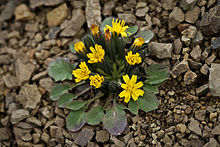Askellia pygmaea
| Askellia pygmaea | |
|---|---|

| |
| Scientific classification | |
| Kingdom: | Plantae |
| Clade: | Tracheophytes |
| Clade: | Angiosperms |
| Clade: | Eudicots |
| Clade: | Asterids |
| Order: | Asterales |
| Family: | Asteraceae |
| Genus: | Askellia |
| Species: | A. pygmaea
|
| Binomial name | |
| Askellia pygmaea | |
| Synonyms[1] | |
| |
Askellia pygmaea, the dwarf alpine hawksbeard,[2] is a species of Asian and North American plants in the tribe Cichorieae within the family Asteraceae.
Distribution
[edit]It is native to western, northern, and eastern Canada (Yukon, Northwest Territories, British Columbia, Alberta, Nunavut, Quebec, Labrador, Newfoundland), the western United States (Alaska, Montana, Wyoming, Colorado, Idaho, Utah, Nevada, Washington, Oregon, California), Russia, Mongolia, Kazakhstan, and western China (Tibet + Xinjiang).[3][4]
Description
[edit]Askellia pygmaea is a perennial up to 20 cm (8 inches) tall, with a deep taproot and spreading by means of underground rhizomes thus forming dense clumps. Stems are sometimes erect, but sometimes trailing along the ground. One plant can have more than 80 small flower heads, each with 9-12 yellow ray florets but no disc florets.[5][4]
References
[edit]- ^ The Plant List, Askellia pygmaea (Ledeb.) Sennikov
- ^ NRCS. "Crepis nana". PLANTS Database. United States Department of Agriculture (USDA). Retrieved 21 June 2015.
- ^ Biota of North America Program, 2014 state-level distribution map
- ^ a b Flora of China, 矮小假苦菜 ai xiao jia ku cai Askellia pygmaea (Ledebour) Sennikov, Komarovia. 5: 86. 2008.
- ^ Flora of North America, Dwarf alpine hawksbeard, Crepis nana Richardson
![]() Media related to Askellia pygmaea at Wikimedia Commons
Media related to Askellia pygmaea at Wikimedia Commons

